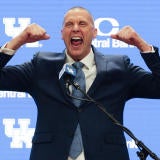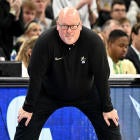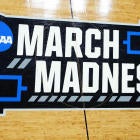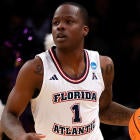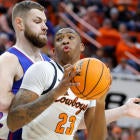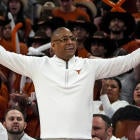Over the past 10 years, there have been an average of 11.3 coaching changes per year in college basketball's major seven conferences, with a low of seven coming in 2013 and a high of 14 last year and in 2014. But so far this season, there have been a grand total of zero coaching changes in the AAC, AAC, Big East, Big Ten, Big 12, Pac-12 and SEC.
The unprecedented circumstances of the international coronavirus pandemic are slowing the sport's coaching carousel and appear to have temporarily cooled the seats of coaches under scrutiny in the major seven.
For larger schools, there is a belief among some athletic directors that the financial uncertainty brought on by the coronavirus threat that led to the cancellation of the NCAA Tournament is what has led to the unprecedented pause in firings. Normally, paying a coach's buyout is not an issue for a power conference school. But the cancellation of the NCAA Tournament will have an impact on the budget of every Division I school. Plus, depending on the financial footing of a school's major boosters, there could be trouble wrangling up enough money to attract a top-flight candidate, athletic directors said.
But Division I is comprised of 353 schools, and even if the biggest schools haven't made changes yet, some of them decided to proceed with coaching searches that have posed unusual challenges for athletic directors who are being pulled in multiple directions while dealing with the widespread fallout of the COVID-19 epidemic.
"You adapt," said Loyola Marymount Athletic Director Craig Pintens, who completed his coaching search last week by hiring Marquette associate head coach Stan Johnson as the next Lions' coach. "The great thing about working in college athletics is, unfortunately, we don't get a lot of opportunities to be proactive in a lot of things. You have to be reactive and go with how things happen in the moment. So you feel equipped.
"But nobody is totally equipped for something like this."
Among the challenges of conducting a coaching search amid the pandemic, logistical and financial concerns topped the list. Wyoming Athletic Director Tom Burman found that conducting the desired number of in-person interviews was impractical and that some potential candidates were hesitant to pursue any vacancy because of the timing.
"There were some who chose not to interview only because there were so many questions going on about travel," Burman said. "I wanted face-to-face at some point. But if you were a coach with a young family, is it the right time to pack up and say to your wife and your kids, 'hey we'll be together in three months but I've got to go to Wyoming and focus on my career? That's a hard conversation to have right now with your spouse."
Burman landed on Northern Colorado coach Jeff Linder, a top candidate from the start who happened to be nearby Wyoming's relatively isolated campus. But Burman wanted to be thorough in his search. So he traveled, as he normally might, and set up shop in a hotel to meet candidates.
"I was paranoid, I'll be honest with you," Burman said. "I had wipes everywhere. I wiped down seats. I wiped down everything. I stayed in a very nice hotel because I figured it would be cleaner. All of these things come into play. At the end of the day, we were able to hire a guy that was 75 miles away and had actually beat us three times in a row. So I had seen him play. It worked out great. But this epidemic added multiple dimensions."
Wyoming had planned for its in-house video team to get footage of the school's new coach walking off a plane after he was hired, talking to the players in a meeting and engaging with fans at introductory events. But all of the staples of introducing a prominent new coach on campus are falling by the wayside this year.
Instead, Burman and Linder participated in a media call-in the morning after the hire was announced. Then the two took a facilities tour and talked about the program's before Linder hit the road to meet his players, who had returned to their homes.
Other programs making hires have attempted to create the visual of an introductory press conference. New UAB coach Andy Kennedy wore a suit and stood at a podium Monday in front of a massive school logo. He gave an impassioned speech. At first glance, it looked like a normal introduction ceremony for a new coach.
But Kennedy was not looking out over a crowd of school officials, reporters and boosters. He was looking into a camera broadcasting the ceremony over Facebook Live.
"We are living in usual times," Kennedy said. "Hence, a press conference with no people."
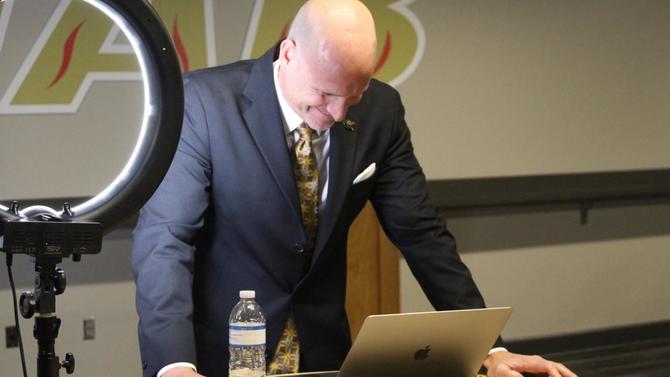
The "hardest part" of introducing a new coach amid the pandemic, though, is dealing with the reality that most players have left campus, Pintens said. Six of the program's players with eligibility remaining are international players.
"They're now scattered all over the world," Pintens said. "Some of our student-athletes who are international are probably going to see the coach on Skype or FaceTime or whatever they choose to meet him on. That's a challenge."
Southeast Missouri State Athletic Director Brady Barke also found that issue to be a recurring concern among candidates he spoke with during a search that was nearing its conclusion early this week. With the NCAA also considering a proposal that would allow all Division I players to transfer once without having to sit out a year, "the whole situation has created uncertainty," Barke said.
If you can't meet your players and are relying on technology to build relationships at a time when transferring could become more attractive than ever, what does that mean for a first-year coach's chance of assembling a competitive roster?
"What does that look like?" Barke said. "Is it getting a Zoom call?"
But there have been a couple of silver linings that have emerged during college basketball's coaching searches this year.
Barke, at Southeast Missouri State, noticed the pool of candidates seemed large due to the fact that many schools have opted not make moves.
Another positive that Burman found at Wyoming was the "more than surprising" amount of positive feedback that came from sports-starved supporters of the program after Linder was announced as coach.
"I think some of that is because America needs some escapes once in a while right now," Burman said. "We need to think about something else other than the hospitals being overridden with sick people. That's a terrifying concept. I think it helped to give them a release. There were a lot of comments.
"I wish could provide more of that right now. But we're like everybody. We're hunkered down and trying to get through."







